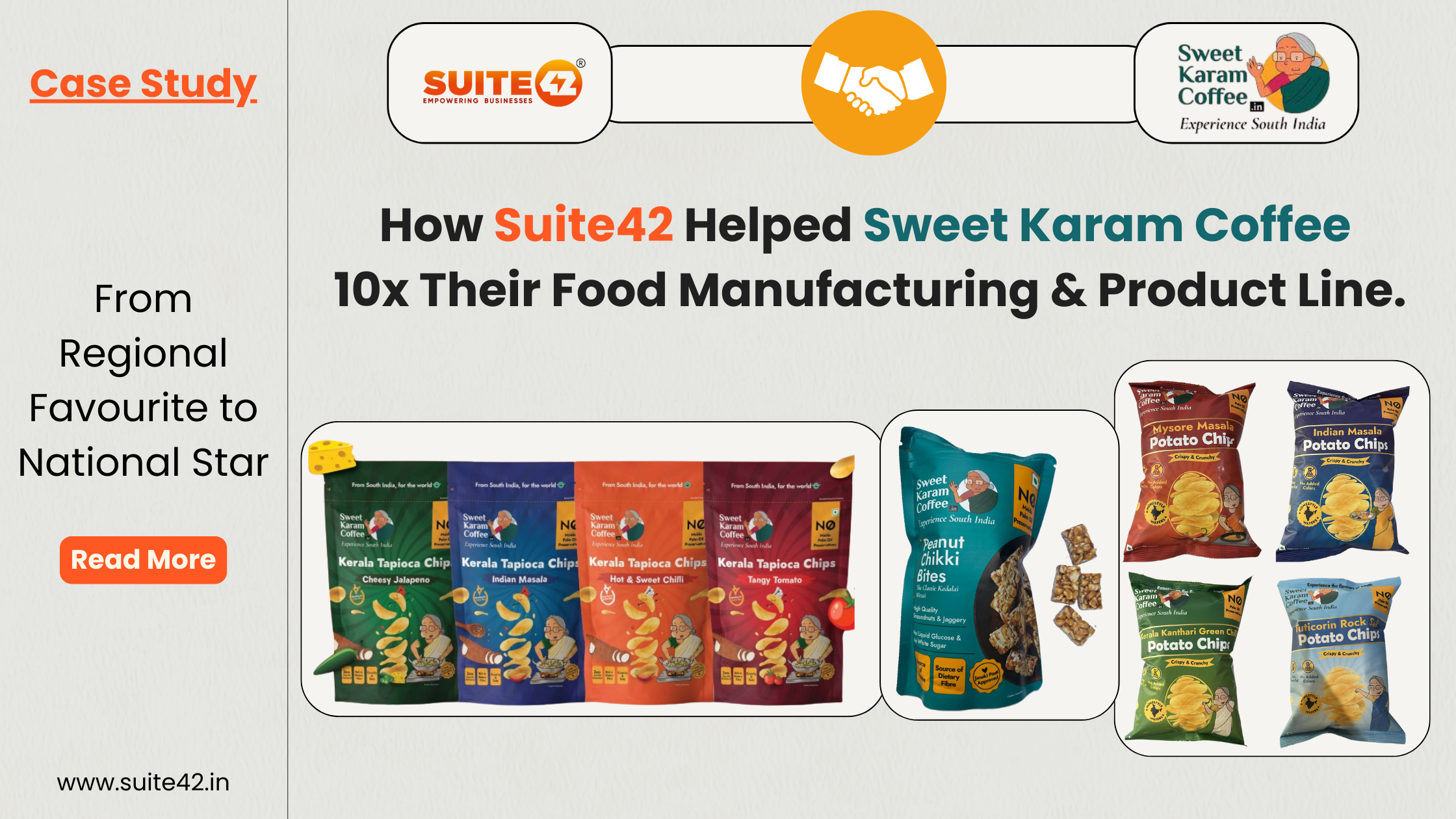
The Future of Food: How Food Contract Manufacturing Can Help You Adapt to Emerging Trends
Understanding the Future of Food: Trends Shaping the Food Contract Manufacturing
The culinary landscape is undergoing a profound transformation, driven by a confluence of factors that are reshaping consumer preferences and industry dynamics. From the rise of personalized nutrition to the advent of lab-grown meat, the future of food is marked by innovation and disruption.
The rise of personalized nutrition
Personalized nutrition, once a niche concept, is rapidly gaining traction as consumers seek tailored dietary solutions that cater to their unique needs and preferences. Advancements in genomics, metabolomics, and digital health technologies are enabling the creation of personalized meal plans, supplements, and functional foods that optimize health and well-being.
Lab-grown meat and alternative proteins
The quest for sustainable and ethical food sources has spurred the development of lab-grown meat and alternative proteins. Cultured meat, derived from animal cells grown in a controlled environment, offers a promising solution to the environmental and ethical concerns associated with traditional livestock farming. Additionally, plant-based proteins, such as legumes, nuts, and grains, are gaining popularity as consumers explore healthier and more sustainable dietary options.
Plant-based foods and the shift toward sustainable eating
The growing awareness of climate change and its impact on food systems has led to a surge in demand for plant-based foods. Consumers are increasingly seeking sustainable alternatives to animal-derived products, driven by concerns about environmental sustainability, animal welfare, and personal health. This shift has created a thriving market for vegan and vegetarian products, ranging from plant-based burgers and milk to innovative meat substitutes.
Tech innovations in food processing and safety
Technological advancements are revolutionizing the food industry, from production and processing to packaging and safety. Artificial intelligence, blockchain, and the Internet of Things (IoT) are being leveraged to improve food quality, reduce waste, and ensure traceability throughout the supply chain. These innovations are enhancing food safety, optimizing production processes, and providing consumers with greater transparency and confidence in the products they consume.
Emerging food trends in India: A closer look at local preferences
India, with its rich culinary heritage and diverse regional tastes, is witnessing a dynamic food landscape. Emerging trends include a growing preference for healthy and natural foods, a focus on regional cuisines and traditional flavors, and a rising demand for convenience and ready-to-eat meals. Understanding these local preferences is crucial for food brands seeking to tap into the Indian market.
An article that might interest you: The Rise of Automation: How is Technology Transforming Food Contract Manufacturing?
Why Food Brands Must Adapt to Changing Consumer Demands?
The future of food is characterized by evolving consumer preferences and expectations. Food brands must adapt to these changes to remain competitive and relevant.
Health-conscious consumers: Prioritizing nutrition and safety
Consumers are becoming increasingly health-conscious, seeking foods that are nutritious, safe, and aligned with their wellness goals. This trend has led to a demand for clean labels, reduced additives, and products that are free from artificial ingredients. Food brands must prioritize product quality, transparency, and nutritional value to meet the expectations of health-conscious consumers.
Sustainability as a core purchasing decision
Sustainability is no longer a niche concern but a mainstream consideration for consumers. As environmental awareness grows, consumers are seeking food products that are ethically sourced, sustainably produced, and minimize their ecological footprint. Food brands must demonstrate their commitment to sustainability through transparent supply chains, eco-friendly packaging, and responsible sourcing practices.
The shift toward transparency and clean labels
Consumers are demanding greater transparency and clarity in food labeling. They want to know exactly what is in their food, from ingredients to production methods. Clean labels, which feature simple, recognizable ingredients, are becoming increasingly popular. Food brands must be transparent about their ingredients, production processes, and sustainability practices to build trust with consumers.
Cultural influences and regional tastes in India
India’s diverse cultural landscape and regional variations in taste preferences present unique opportunities and challenges for food brands. Understanding and catering to local tastes is essential for success. Food brands must adapt their product offerings to meet the specific needs and preferences of different regions within India.

The Role of Food Contract Manufacturing in Food Innovation
Food Contract manufacturing, a strategic partnership between food brands and specialized manufacturing facilities, can play a pivotal role in driving innovation and ensuring success in the dynamic food industry.
What is contract manufacturing for food brands?: Food Contract manufacturing involves outsourcing the production of food products to specialized facilities that have the expertise, equipment, and infrastructure to handle various aspects of the manufacturing process. This can include product development, formulation, production, packaging, and quality control.
How food contract manufacturing supports innovation and flexibility: Contract manufacturing offers several benefits for food brands, including increased flexibility, accelerated time-to-market, and access to specialized expertise. By partnering with contract manufacturers, food brands can quickly introduce new products, experiment with innovative formulations, and leverage the latest technologies without the need for significant capital investment.
The impact of food contract manufacturing on cost efficiency and scalability: Contract manufacturing can also be a cost-effective solution for food brands. By sharing production costs and risks with contract manufacturers, brands can optimize their operations and improve their bottom line. Additionally, contract manufacturers can provide the necessary scalability to meet increasing demand without the need for significant capital expenditures.
How Food Contract Manufacturing Helps You Embrace Emerging Food Trends?
Food Contract manufacturing can be a valuable tool for food brands seeking to adapt to emerging trends and meet the evolving needs of consumers.
Supporting personalized nutrition through innovative formulations: Contract manufacturers can collaborate with food brands to develop innovative formulations that cater to the diverse needs of consumers. By leveraging their expertise in product development and formulation, contract manufacturers can help create personalized nutrition products, functional foods, and tailored meal plans.
Scaling production of lab-grown meat and plant-based alternatives: As the demand for lab-grown meat and plant-based alternatives grows, contract manufacturers can play a crucial role in scaling up production. With their specialized facilities and expertise, contract manufacturers can support the commercialization of these innovative products, ensuring quality, consistency, and efficiency.
Meeting evolving sustainability and health standards: Contract manufacturers can help food brands meet the stringent sustainability and health standards that are becoming increasingly important to consumers. By adhering to industry best practices, implementing quality control measures, and ensuring compliance with relevant regulations, contract manufacturers can contribute to the production of safe, sustainable, and high-quality food products.
Quick adaptation to local Indian consumer trends: Contract manufacturers with a deep understanding of the Indian market can help food brands navigate the complexities of local consumer preferences and regulations. By leveraging their knowledge and expertise, contract manufacturers can support brands in developing products that resonate with Indian consumers and meet their specific needs.
An article that might interest you: Sustainability in Focus: Exploring Eco-Friendly Practices in Food Manufacturing
Overcoming Challenges in the Indian Food Industry with Contract Manufacturing
The Indian food industry faces several challenges, including regulatory hurdles, supply chain disruptions, and cultural diversity. Food Contract manufacturing can help address these challenges and facilitate growth.
Regulatory hurdles and compliance: Navigating the complex regulatory landscape in India can be time-consuming and challenging. Contract manufacturers with a deep understanding of Indian food regulations can help brands ensure compliance, avoid costly mistakes, and accelerate time-to-market.
Supply chain disruptions and managing costs: The Indian food industry is susceptible to supply chain disruptions and fluctuations in raw material costs. Contract manufacturers can help mitigate these risks by establishing strong supplier relationships, optimizing logistics, and managing costs effectively.
Navigating cultural diversity and regional preferences in India: India’s diverse cultural landscape and regional variations in taste preferences present unique challenges for food brands. Contract manufacturers with a deep understanding of Indian culture and regional tastes can help brands develop products that resonate with local consumers and meet their specific needs.
Suite42: A Partner for Food Innovation in India
Tailored solutions for emerging food trends: Suite42 offers a comprehensive range of services to support food innovation, including product development, formulation, manufacturing, packaging, and quality control. With a focus on emerging trends, Suite42 can help brands develop innovative products that meet the evolving needs of consumers.
Expertise in navigating Indian food regulations: Suite42 has a deep understanding of Indian food regulations and can provide guidance on compliance, labeling requirements, and safety standards. This expertise can help brands avoid costly mistakes and accelerate time-to-market.
Collaboration opportunities for food tech and R&D: Suite42 is committed to fostering innovation and collaboration in the food industry. The company works closely with food tech startups, research institutions, and industry experts to develop cutting-edge products and solutions.

Launching New Food Products in India: How Contract Manufacturing Can Help?
Contract manufacturing can be a strategic advantage for food brands looking to launch new products in India.
Accelerating time-to-market for innovative food products: By leveraging the expertise and infrastructure of contract manufacturers, food brands can significantly reduce the time it takes to bring new products to market. This can help brands capitalize on emerging trends and gain a competitive edge.
Custom manufacturing solutions for niche food segments: Contract manufacturers can provide tailored solutions for niche food segments, allowing brands to target specific consumer groups and meet their unique needs. This can be particularly valuable for brands targeting regional markets or niche dietary preferences.
Maintaining quality and consistency in large-scale production: Ensuring consistent quality and safety in large-scale food production can be challenging. Contract manufacturers with state-of-the-art facilities and quality control systems can help brands maintain high standards and deliver products that meet consumer expectations.
Finding the Right Contract Manufacturer for Your Food Business in India
Selecting the right contract manufacturer is crucial for the success of any food brand.
Key criteria to consider when selecting a contract manufacturer: When evaluating potential contract manufacturers, it is important to consider factors such as their expertise, experience, facilities, quality standards, certifications, and track record. Look for a contract manufacturer that has a proven track record in the food industry and can demonstrate their ability to meet your specific needs.
Questions to ask when evaluating a contract manufacturer: To assess the suitability of a contract manufacturer, ask the following questions:
- What is your experience in manufacturing similar products?
- Can you provide references from previous clients?
- What are your quality control processes and certifications?
- What is your capacity and flexibility to handle fluctuations in demand?
- What are your lead times and turnaround times?
- How do you ensure compliance with food safety regulations?
- Can you provide information on your sustainability practices?
Why partnering with Suite42 ensures success: Suite42 is a leading contract manufacturing partner that can help food brands navigate the complexities of the Indian food industry and achieve their goals. With our expertise, state-of-the-art facilities, and commitment to quality, we can provide the support you need to succeed.
Contract Manufacturing for Plant-Based Food in India
The demand for plant-based and vegan foods is rapidly growing in India, driven by increasing health consciousness, environmental concerns, and cultural shifts. Contract manufacturing can play a crucial role in supporting the growth of this market.
The growing market for plant-based and vegan foods in India: India’s large and diverse population, coupled with rising disposable incomes and changing dietary preferences, is creating a favorable environment for the growth of plant-based and vegan foods. Consumers are seeking healthier, sustainable, and ethical alternatives to traditional animal-derived products.
Benefits of working with a specialized contract manufacturer for plant-based products
Partnering with a contract manufacturer that specializes in plant-based products can offer several benefits, including:
- Expertise and experience: Specialized contract manufacturers have the knowledge and expertise to develop and produce high-quality plant-based products that meet consumer expectations.
- Innovative formulations: Contract manufacturers can collaborate with food brands to create innovative and delicious plant-based products that are appealing to a wide range of consumers.
- Scalability and flexibility: Contract manufacturers can provide the necessary scalability to meet increasing demand for plant-based products, while also offering flexibility to accommodate changing market trends.
- Compliance with regulations: Contract manufacturers can ensure compliance with relevant food safety and labeling regulations for plant-based products.
Case studies: Successful plant-based launches through contract manufacturing: Suite42 has a track record of successfully supporting the launch of plant-based food products in India. Our clients have benefited from our expertise in product development, manufacturing, and marketing, enabling them to achieve significant market penetration and growth.
How Contract Manufacturers Help Meet Changing Consumer Demands in India?
Contract manufacturers can help food brands adapt to changing consumer demands by providing flexibility, innovation, and scalability.
Aligning product offerings with consumer preferences: Contract manufacturers can work with food brands to develop products that align with evolving consumer preferences. This includes understanding emerging trends, conducting market research, and developing innovative formulations that meet consumer needs.
Fast-tracking innovation in response to trends: Contract manufacturers can help food brands quickly introduce new products and respond to emerging trends. By leveraging their expertise and infrastructure, contract manufacturers can accelerate time-to-market and ensure that brands stay ahead of the competition.
Ensuring scalability while maintaining product integrity: As the demand for food products grows, contract manufacturers can provide the necessary scalability to meet increasing production volumes. This ensures that brands can meet consumer demand without compromising product quality or consistency.
The Future of Food Production: Contract Manufacturing as a Long-Term Solution
Contract manufacturing is poised to play a vital role in shaping the future of food production. By partnering with contract manufacturers, food brands can adapt to emerging trends, navigate challenges, and ensure long-term success.
Adapting to future trends with contract manufacturing: The food industry is constantly evolving, with new trends and technologies emerging on a regular basis. Contract manufacturers can help food brands stay ahead of the curve by providing the flexibility, innovation, and expertise needed to adapt to future trends.
Leveraging technology for continuous innovation: Contract manufacturers are increasingly adopting advanced technologies to improve their operations and enhance product quality. By leveraging these technologies, contract manufacturers can help food brands drive innovation and create new opportunities.
How Suite42 can future-proof your food business in a dynamic market: Suite42 is committed to helping food brands thrive in a dynamic and competitive market. By partnering with us, you can benefit from our expertise, innovation, and commitment to quality. We will work with you to develop and produce high-quality food products that meet the evolving needs of consumers and ensure the long-term success of your business.






Leave a Reply